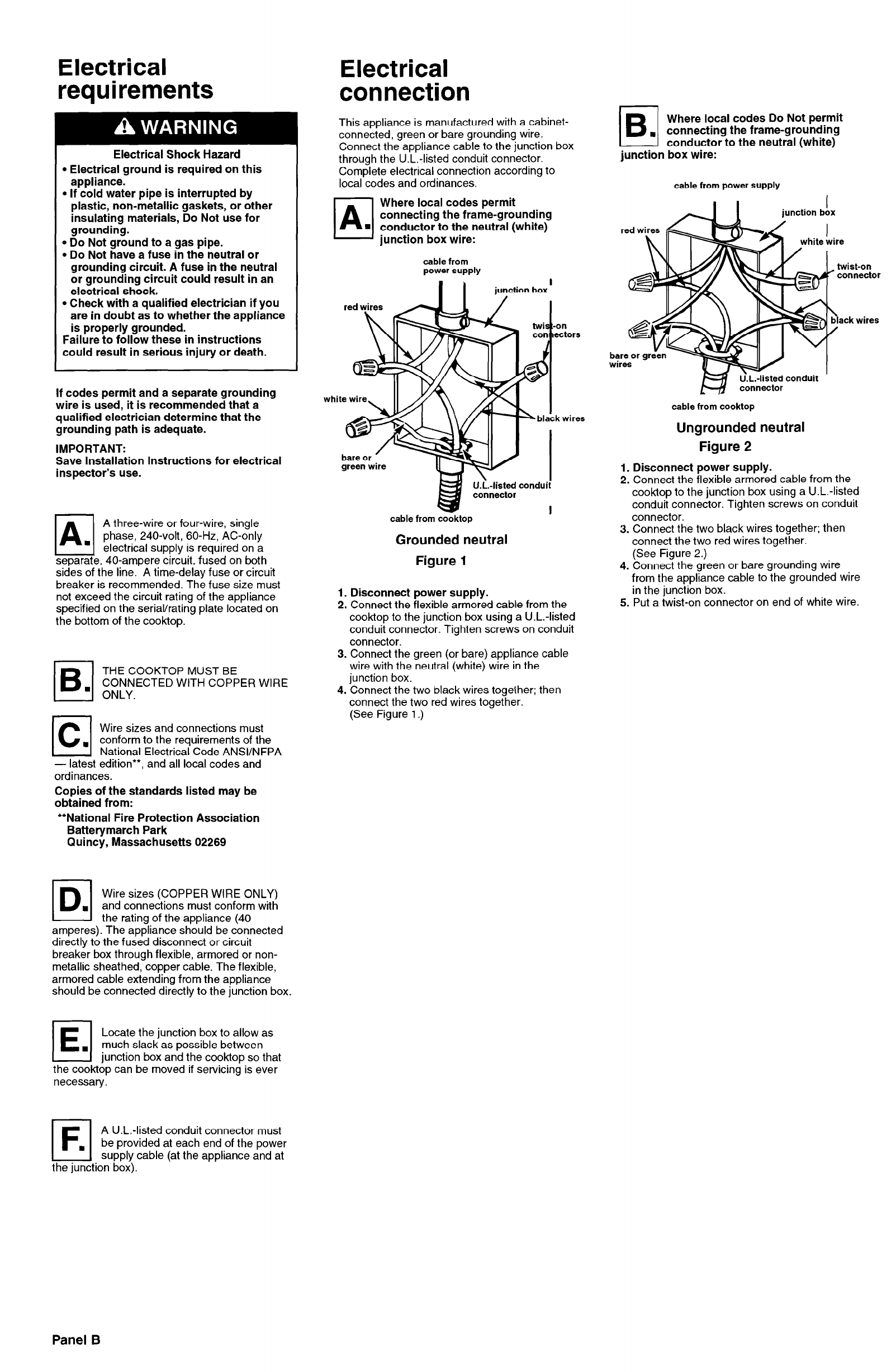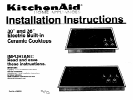
Electrical
requirements
Electrical
connection
Electrical Shock Hazard
l Electrical ground is required on this
appliance.
l If cold water pipe is interrupted by
plastic, non-metallic gaskets, or other
insulating materials, Do Not use for
grounding.
l Do Not ground to a gas pipe.
l Do Not have a fuse in the neutral or
grounding circuit. A fuse in the neutral
or grounding circuit could result in an
electrical shock.
l Check with a qualified electrician if you
are in doubt as to whether the appliance
is properly grounded.
Failure to follow these in instructions
could result in serious injury or death.
If codes permit and a separate grounding
wire is used, it is recommended that a
qualified electrician determine that the
grounding path is adequate.
IMPORTANT:
Save Installation Instructions for electrical
inspector’s use.
q
A
A three-wire or four-wire, single
.
phase, 240-volt, 60-Hz, AC-only
electrical supply is required on a
separate, 40-ampere circuit, fused on both
sides of the line. A time-delay fuse or circuit
breaker is recommended. The fuse size must
not exceed the circuit rating of the appliance
specified on the serial/rating plate located on
the bottom of the cooktop.
u
B
THE COOKTOP MUST BE
CONNECTED WITH COPPER WIRE
’ ONLY.
II
C
Wire sizes and connections must
.
conform to the requirements of the
National Electrical Code ANSVNFPA
- latest edition**,
and all local codes and
ordinances.
Copies of the standards listed may be
obtained from:
**National Fire Protection Association
Batterymarch Park
Quincy, Massachusetts 02269
q
D
Wire sizes (COPPER WIRE ONLY)
and connections must conform with
the rating of the appliance
(40
amperes). The appliance should be connected
directly to the fused disconnect or circuit
breaker box through flexible, armored or non-
metallic sheathed, copper cable. The flexible,
armored cable extending from the appliance
should be connected directly to the junction box.
JE.I
Locate the junction box to allow as
much slack as possible between
junction box and the cooktop so that
the cooktop can be moved if servicing is ever
necessary.
This appliance is manufactured with a cabinet-
connected, green or bare grounding wire.
Connect the appliance cable to the junction box
through the U.L.-listed conduit connector.
Complete electrical connection according to
local codes and ordinances.
17
A
Where local codes permit
connecting the frame-grounding
n conductor to the neutral (white)
junction box wire:
cable from
power supply
red wires
white wire.
II n\\
kb’
black wires
bare or
green wire
\-
I
U.L.-listed conduit
connector
cable from cooktop
Grounded neutral
Figure 1
1. Disconnect power supply.
2. Connect the flexible armored cable from the
cooktop to the junction box using a U.L.-listed
conduit connector. Tighten screws on conduit
connector.
3. Connect the green (or bare) appliance cable
wire with the neutral (white) wire in the
junction box.
4. Connect the two black wires together; then
connect the two red wires together.
(See Figure 1.)
Where local codes Do Not permit
connecting the frame-grounding
conductor to the neutral (white)
junction box wire:
cable from power supply
l
junction box
*k white !vire
T connector
connector
cable from cooktop
Ungrounded neutral
Figure 2
1. Disconnect power supply.
2. Connect the flexible armored cable from the
cooktop to the junction box using a U.L.-listed
conduit connector. Tighten screws on conduit
connector.
3. Connect the two black wires together; then
connect the two red wires together.
(See Figure 2.)
4. Connect the green or bare grounding wire
from the appliance cable to the grounded wire
in the junction box.
5. Put a twist-on connector on end of white wire.
A U.L.-listed conduit connector must
be provided at each end of the power
supply cable (at the appliance and at
the junction box).
Panel B







